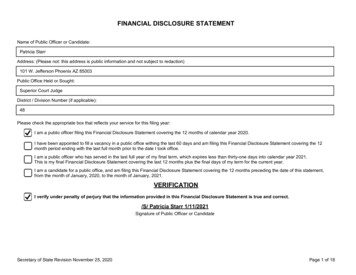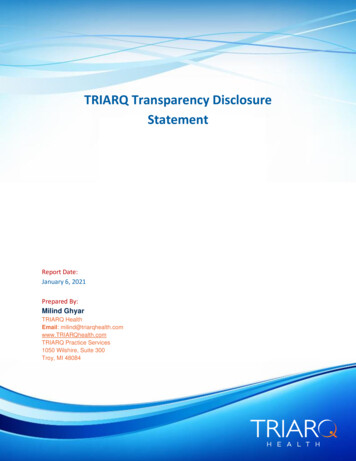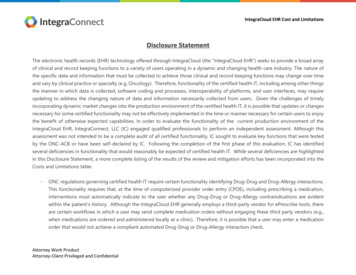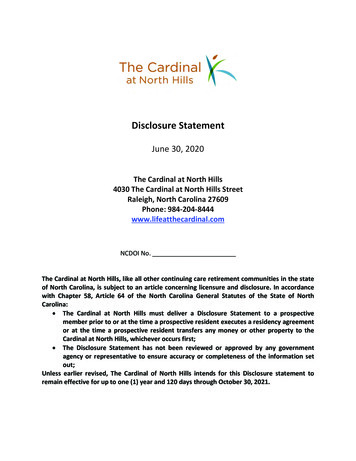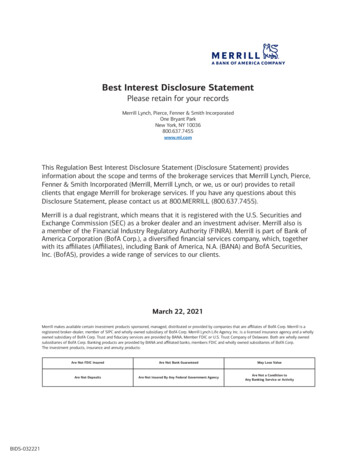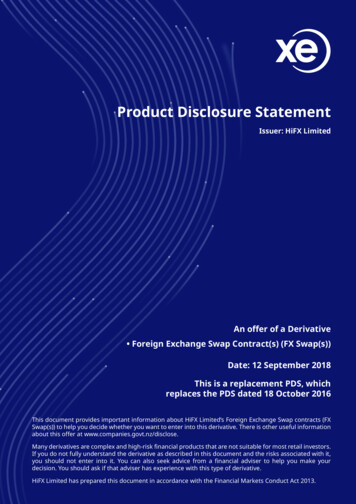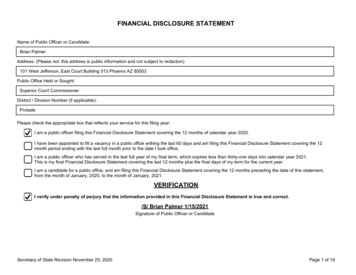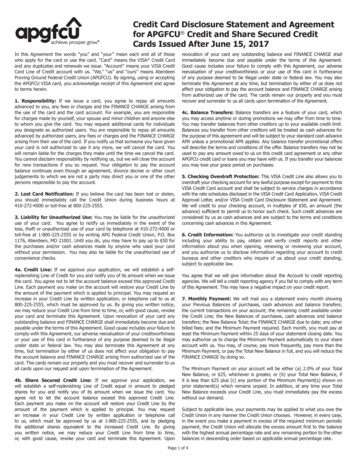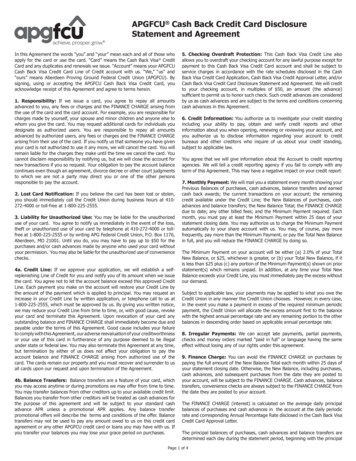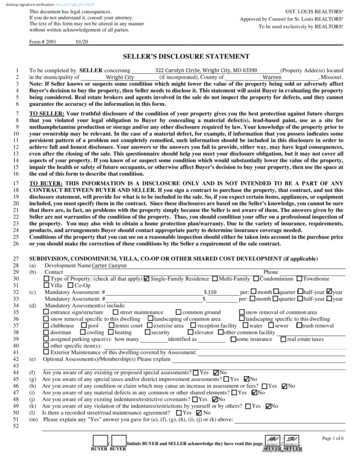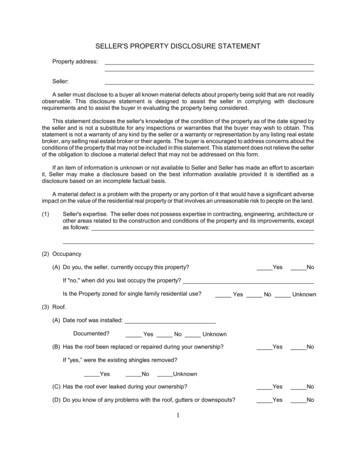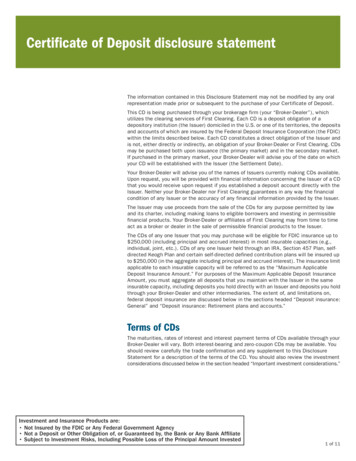
Transcription
Certificate of Deposit disclosure statementThe information contained in this Disclosure Statement may not be modified by any oralrepresentation made prior or subsequent to the purchase of your Certificate of Deposit.This CD is being purchased through your brokerage firm (your “Broker-Dealer”), whichutilizes the clearing services of First Clearing. Each CD is a deposit obligation of adepository institution (the Issuer) domiciled in the U.S. or one of its territories, the depositsand accounts of which are insured by the Federal Deposit Insurance Corporation (the FDIC)within the limits described below. Each CD constitutes a direct obligation of the Issuer andis not, either directly or indirectly, an obligation of your Broker-Dealer or First Clearing. CDsmay be purchased both upon issuance (the primary market) and in the secondary market.If purchased in the primary market, your Broker-Dealer will advise you of the date on whichyour CD will be established with the Issuer (the Settlement Date).Your Broker-Dealer will advise you of the names of Issuers currently making CDs available.Upon request, you will be provided with financial information concerning the Issuer of a CDthat you would receive upon request if you established a deposit account directly with theIssuer. Neither your Broker-Dealer nor First Clearing guarantees in any way the financialcondition of any Issuer or the accuracy of any financial information provided by the Issuer.The Issuer may use proceeds from the sale of the CDs for any purpose permitted by lawand its charter, including making loans to eligible borrowers and investing in permissiblefinancial products. Your Broker-Dealer or affiliates of First Clearing may from time to timeact as a broker or dealer in the sale of permissible financial products to the Issuer.The CDs of any one Issuer that you may purchase will be eligible for FDIC insurance up to 250,000 (including principal and accrued interest) in most insurable capacities (e.g.,individual, joint, etc.). CDs of any one Issuer held through an IRA, Section 457 Plan, selfdirected Keogh Plan and certain self-directed defined contribution plans will be insured upto 250,000 (in the aggregate including principal and accrued interest). The insurance limitapplicable to each insurable capacity will be referred to as the “Maximum ApplicableDeposit Insurance Amount.” For purposes of the Maximum Applicable Deposit InsuranceAmount, you must aggregate all deposits that you maintain with the Issuer in the sameinsurable capacity, including deposits you hold directly with an Issuer and deposits you holdthrough your Broker-Dealer and other intermediaries. The extent of, and limitations on,federal deposit insurance are discussed below in the sections headed “Deposit insurance:General” and “Deposit insurance: Retirement plans and accounts.”Terms of CDsThe maturities, rates of interest and interest payment terms of CDs available through yourBroker-Dealer will vary. Both interest-bearing and zero-coupon CDs may be available. Youshould review carefully the trade confirmation and any supplement to this DisclosureStatement for a description of the terms of the CD. You should also review the investmentconsiderations discussed below in the section headed “Important investment considerations.”Investment and Insurance Products are: Not Insured by the FDIC or Any Federal Government Agency Not a Deposit or Other Obligation of, or Guaranteed by, the Bank or Any Bank Affiliate Subject to Investment Risks, Including Possible Loss of the Principal Amount Invested1 of 11
The CDs will mature on the date indicated on the trade confirmation. The CDs will not beautomatically renewed or rolled over and interest on the CDs will not continue to accrue orin the case of zero-coupon CDs, accrete after maturity. At maturity the CD balances will beremitted by the Issuer to First Clearing and credited to your brokerage account. If thematurity date is not a business day, the CD balances will be paid on the next succeedingbusiness day. A “business day” shall be a day on which First Clearing and the banks inboth the Issuer’s domicile and New York are open for business. In certain limitedcircumstances, your Broker-Dealer may sell new issue CDs for an amount less than thestated deposit amount (“rebate”) at the initial offering.Interest-bearing CDs—Interest-bearing CDs pay interest at either a fixed rate or at avariable rate. A fixed rate CD will pay the same interest rate throughout the life of the CD.The interest rate on variable rate CDs may increase or decrease from the initial rate at predetermined time periods (“step-rates”) or may be re-set at specified times based upon thechange in a specific index or indices (“floating rates”). The dates on which the rates onstep-rate CDs will change or the rates on floating rate CDs will re-set, as well as adescription of the basis on which the rate will be re-set, will be set forth on the tradeconfirmation or a supplement to this Disclosure Statement.Interest-bearing CDs are offered in a wide range of maturities and are made available inminimum denominations and increments of 1,000.Unless otherwise specified in the trade confirmation or any supplement to this DisclosureStatement, interest earned on interest-bearing CDs with original maturities of one year orless will be paid at the maturity of such CDs and interest earned on interest-bearing CDswith original maturities of more than one year will be paid monthly, quarterly, semiannuallyor annually and at maturity. Interest on variable rate CDs will be re-set periodically andinterest will be paid monthly, quarterly, semiannually or annually and at maturity asspecified on the trade confirmation or any supplement to this Disclosure Statement.Interest payments on interest-bearing CDs are automatically credited to your account withyour Broker-Dealer. Interest will accrue up to, but not including, the interest payment date,the maturity date or any call date. If an interest payment date falls on a day that is not abusiness day, interest will be paid on the first business day following the interest paymentdate. For specific rate information for any interest period, please contact your Broker-Dealer.Interest on CDs is not compounded. Interest on CDs in the primary market is calculated onthe basis of the actual number of days elapsed over a 365-day year. However, the amountof interest on CDs that are purchased in the secondary market may be based on otherinterest rate calculations. Please contact your Broker-Dealer with questions concerning theinterest rate calculation on a secondary market CD.Zero-coupon CDs—Zero-coupon CDs do not bear interest, but rather are issued at asubstantial discount from the face or par amount, the minimum amount of which is 1,000. Interest on the CD will accrete at an established rate and the holder will be paidthe par amount at maturity.Call feature—Some CDs may be subject to redemption, or called, on a specified date ordates prior to the maturity date, at the sole discretion of the Issuer. If the CD is called, youwill be paid the outstanding principal amount and interest accrued or accreted up to, butnot including, the call date. The dates on which the CD may be called will be specified inthe trade confirmation or a supplement to this Disclosure Statement.Your relationship with the IssuerYou will not receive a passbook, certificate or other evidence of ownership of the CD fromthe Issuer. The CDs are evidenced by one or more master certificates issued by the Issuer,each representing a number of individual CDs. These master certificates are held by TheDepository Trust Company (“DTC”), a sub-custodian which is in the business of performingsuch custodial services. First Clearing (Wells Fargo Clearing Services, LLC), as custodian,keeps records of the ownership of each CD and will provide you with a written confirmationof your purchase. You will also be provided with a periodic account statement from yourBroker-Dealer which will reflect your CD ownership. You should retain the trade confirmationand the account statement(s) for your records. The purchase of a CD is not recommendedfor persons who wish to take actual possession of a certificate.2 of 11
Your account statement from your Broker-Dealer may provide an estimate of the price youmight receive on some or all of your CDs if you were able to sell them prior to maturity. Anyprices on your statement are estimates and are not based on actual market prices. YourBroker-Dealer will provide an explanation of its statement pricing policies at your request.Your deposit insurance coverage and, if your CD is callable, the amount you would receive ifyour CD is called will be determined based on the outstanding principal amount of your CD,or the accreted value in the case of a zero-coupon CD, not the estimated price. See thesections headed “Deposit insurance: General” and “Secondary market.”Each CD constitutes a direct obligation of the Issuer and is not, either directly or indirectly,an obligation of your Broker-Dealer or First Clearing. No deposit relationship shall bedeemed to exist prior to the receipt and acceptance of your funds by the Issuer.If you choose to remove your Broker-Dealer as your agent with respect to your CD, you may(i) transfer your CD to another agent, provided that the agent is a member of DTC (mostmajor brokerage firms are members; many banks and savings institutions are not); or(ii) request that your ownership of the CD be evidenced directly on the books of the Issuer,subject to applicable law and the Issuer’s terms and conditions, including those related tothe manner of evidencing CD ownership. If you choose to remove your Broker-Dealer asyour agent, your Broker-Dealer will have no further responsibility for payments made withrespect to your CD. If you establish your CD on the books of the Issuer, you will have theability to enforce your rights in the CD directly against the Issuer.Important investment considerationsBuy and hold—BCDs are most appropriate for purchasing and holding to maturity, anddepending on the individual terms of your CD, early withdrawal may not be permitted. If yourCD is callable by the Issuer, you should be prepared to hold it according to its terms.Though not obligated to do so, First Clearing may maintain a secondary market in the CDsafter their Settlement Date. If you are able to sell your CD, the price you receive will reflectprevailing market conditions and your sales proceeds may be less than the amount youpaid for your CD. If you wish to liquidate your CD prior to maturity, you should read withspecial care the sections headed “Additions or withdrawals” and “Secondary market.”Compare features—You should compare the rates of return and other features of the CDsto other available investments before deciding to purchase a CD. The rates paid withrespect to the CDs may be higher or lower than the rates on deposits or other instrumentsavailable directly from the Issuer or through your Broker-Dealer.Callable CDs—Callable CDs are redeemable or callable by the issuer prior to maturity andhave different features and maturities. Callable CDs present different investmentconsiderations than CDs not subject to call by the Issuer. It is important that you know thefeatures and considerations associated with any CD you may purchase and understand theeffect of each feature and consideration on potential investment results. You shouldcarefully review any supplement to this Disclosure Statement or your trade confirmation forthe terms of your CD including the time periods when the Issuer may call your CD. If youhave questions regarding the specific features or considerations of a CD, or theirinvestment effect, you should ask your financial professional for more information.A call by the Issuer is more likely to occur at a time when interest rates available onalternative investments are lower than the rate you are paid on such CD. If you choose toreinvest the proceeds paid to you when the CD is called, you might be required to invest inlower yielding investments, based on the current market rates at the time. Callable CDsmay also be called at a price that is less than the price you paid for the CD if youpurchased the CD in the secondary market at a premium over the par amount (or accretedvalue in the case of a zero-coupon CD).Because the Issuer, and only the issuer, has the right to call the CD and may not exerciseits right to call the CD, you should not rely on the call feature for gaining access to your funds.3 of 11
Variable rate CDs—Variable rate CDs present different investment considerations thanfixed rate CDs. Depending upon the type of variable rate CD (step-rate or floating rate) andthe interest rate environment, the CD may pay substantially more or substantially lessinterest over the term of the CD than would be paid on a fixed rate CD of the samematurity. Furthermore, if the CD is subject to call by the Issuer, (i) you may not receive thebenefits of any anticipated increase in rates paid on a variable rate CD if the CD is called or(ii) you may be required to hold the CD at a lower rate than prevailing market interest ratesif the CD is not called. You should carefully review any supplement to this DisclosureStatement that describes the step-rate or the basis for re-setting a floating rate and, if theCD is subject to call by the Issuer, the time periods when the Issuer may call the CD.Jumbo CDs—Jumbo CDs are CDs that are issued in 100,000 denominations. Onceissued, Jumbo CDs may not be resold in denominations of less than 100,000. In theevent you choose to sell a Jumbo CD prior to maturity, you should be aware that largedenomination CDs may be less liquid, which could lead to a less favorable pricing, thansmaller denomination CDs. In addition, Jumbo CDs are issued in a master certificate thatis held by the clearing firm used by your brokerage firm, not the Depository Trust Company.This means that Jumbo CDs are non-transferable. In the event that you choose to transferyour account to another financial institution, you would either have to sell the Jumbo CDprior to maturity or establish a direct relationship with the issuing bank.Insolvency of the Issuer—In the event the Issuer approaches insolvency or becomesinsolvent, the Issuer may be placed in regulatory conservatorship or receivership with theFDIC typically appointed the conservator or receiver. The FDIC may thereafter pay off theCDs prior to maturity or transfer the CDs to another depository institution. If the CDs aretransferred to another institution, you may be offered a choice of retaining the CDs at alower interest rate or having the CDs paid off. Trades are subject to cancellation, in theevent of a bank failure during the time period between trade date and settlement date, asthe seller remains holder of record until settlement date, and the investor would then besubject to the FDIC process. See the sections headed “Deposit insurance: General” and“Payments under adverse circumstances.”Reinvestment risk—If your CD is paid off prior to maturity as a result of the Issuer’sinsolvency, exercise by the Issuer of any right to call the CD or a voluntary early withdrawal(see the section headed “Additions or withdrawals”) you may be unable to reinvest yourfunds at the same rate as the original CD. Neither your Broker-Dealer nor First Clearing isresponsible to you for any losses you may incur as a result of a lower interest rate on aninvestment replacing your CD.SEC investor tips—The Securities and Exchange Commission periodically publishes tips forinvestors in various financial products, including CDs, on its website. You may accessthese investor tips at www.sec.gov.Deposit insurance: GeneralYour CDs are insured by the FDIC, an independent agency of the U.S. government, to theMaximum Applicable Deposit Insurance Amount (including principal and accrued interest)for all deposits held in the same insurable capacity at any one Issuer. Generally, anyaccounts or deposits that you may maintain directly with a particular Issuer, or through anyother intermediary in the same insurable capacity in which the CDs are maintained, wouldbe aggregated with the CDs for purposes of the Maximum Applicable Deposit InsuranceAmount. In the event an Issuer fails, interest-bearing CDs are insured, up to the MaximumApplicable Deposit Insurance Amount , for principal and interest accrued to the date theIssuer is closed. Zero-coupon CDs are insured to the extent of the original offering priceplus interest at the rate quoted to the depositor on the original offering, accreted to thedate of the closing of the Issuer. Interest is determined for insurance purposes inaccordance with federal law and regulations. The original offering price of a zero-coupon CDplus accreted interest is hereafter called the “accreted value.”You are responsible for monitoring the total amount of deposits that you hold with any oneIssuer, directly or through an intermediary, in order for you to determine the extent ofdeposit insurance coverage available to you on your deposits, including the CDs. Neither yourBroker-Dealer nor First Clearing is responsible for any insured or uninsured portion of theCDs or any other deposits.4 of 11
Under certain circumstances, if you become the owner of CDs or other deposits at anIssuer because another depositor dies, beginning six months after the death of thedepositor the FDIC will aggregate those deposits for purposes of the Maximum ApplicableDeposit Insurance Amount with any other CDs or deposits that you own in the sameinsurable capacity at the Issuer. Examples of accounts that may be subject to this FDICpolicy include joint accounts, “payable on death” accounts and certain trust accounts. TheFDIC provides a six month “grace period” to permit you to restructure your deposits toobtain the maximum amount of deposit insurance for which you are eligible.If your CDs or other deposits at the Issuer are assumed by another depository institutionpursuant to a merger or consolidation, such CDs or deposits will continue to be separatelyinsured from the deposits that you might have established with the acquirer until (i) thematurity date of the CDs or other time deposits which were assumed, or (ii) with respect todeposits which are not time deposits, the expiration of a six month period from the date ofthe acquisition. Thereafter, any assumed deposits will be aggregated with your existingdeposits with the acquirer held in the same insurable capacity for purposes of federaldeposit insurance. Any deposit opened at the Issuer after the acquisition will be aggregatedwith deposits established with the acquirer for purposes of federal deposit insurance.In the event that you purchase a CD in the secondary market at a premium over the paramount (or accreted value in the case of a zero-coupon CD), that premium is not insured.Similarly, you are not insured for any premium reflected in the estimated market value ofyour CD on your account statement. If deposit insurance payments become necessary forthe Issuer, you can lose the premium paid for your CD and will not receive any premiumshown on your account statement. See the section headed “Secondary market.”The application of the Maximum Applicable Deposit Insurance Amount is illustrated byseveral common factual situations discussed below.Individual customer accounts—Deposits of any one Issuer held by an individual in anaccount in the name of an agent or nominee of such individual (such as the CDs held inyour brokerage account) or held by a custodian (for example, under the Uniform Gifts toMinors Act or the Uniform Transfers to Minors Act) are not treated as owned by the agent,nominee or custodian, but are added to other deposits of such individual held in the sameinsurable capacity (including funds held in a sole proprietorship) and insured up to 250,000 in the aggregate. Deposits held through a qualified tuition savings pro
specified on the trade confirmation or any supplement to this Disclosure Statement. Interest payments on interest-bearing CDs are automatically credited to your account with your Broker-Dealer. Interest will accrue up to, but not including, the i

